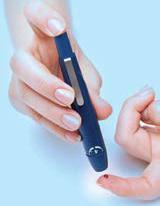Diabetes in Pregnancy


What is Gestational Diabetes Mellitus (GDM)?
Gestational Diabetes is a com-mon complication of pregnan-cy, which is usually symptom free and is diagnosed during routine screening. It usually occurs after the 24th week of pregnancy when your body makes large amount of hor-mones to help your baby grow. These hormones prevent your insulin from working the way it should. When this hap-pens, too much glucose stays in the bloodstream and you get high blood glucose levels (Hyperglycemia)
Am I at risk of having gestational diabetes?
Gestational Diabetes is more common if:
- You have a history of diabetes in your family
- You had gestational diabetes before
- You have high Body Mass Index ( BMI), ie. overweight
- You are older than 25 years
- You smoke
- There is a previous history of unexplained stillbirth (baby death during pregnancy)
- There is a previous history of a large baby( more than 10 lbs, or 4.5 kg)
- You have PCOS (Poly Cystic Ovarian Syndrome)
Will I be tested for gestational diabetes?
Yes, all pregnant woman will be requested to do an Oral Glucose Tolerance Test (OGTT), which is a test that requires you to take a special sweet drink, then to check your sugar in one and two hours. Therefore, we are able to evaluate how your blood sugar will be affected by this drink.
Most women should be tested when they are about 6 or 7 months (24 to 28 weeks) pregnant. However, women at high risk for diabetes may need to be tested earlier in pregnancy
How can Gestational Diabetes affect my baby and me?
If your blood glucose levels remain high, your baby may develop:
- Macrosomia (which means the baby grows very large), which in turn can lead to problems with the delivery of your baby. A large baby born through the birth canal can injure nerves in his shoulder; break its collarbone; or rarely, have brain damage from lack of oxygen).
- Hypoglycemia (which means low blood glucose during the birth of your baby)
- Jaundice (which means the condition will make the baby’s skin look yellow)
Gestational Diabetes increase risk of preeclampsia (high blood pressure) and other things
These risks may be reduced if your blood glucose levels are within the target range.
Blood Glucose Monitoring

You will be required to monitor your blood glucose levels by pricking your finger 3-6 times a day. You will be given instructions on how to perform the tests and a diary to record the results.
The safe range for blood glucose levels is less than 5.3 mmol/l (95 mg/dl) before meals, and less than 7.2-7.8 mmol/l (130- 140 mg/ dl) one hour post meal and less than 6.7 mmol/l (120 mg/ dl) two hours post meal.
How is it treated?

- Diet control: Meal planning is important for you to control your blood glucose. Different food such as Carbohydrates can increase your blood glucose levels more than others. The Dietician in our Diabetes Unit will help you to draw up a plan.
- Increasing the amount of your exercise: low impact activities are safe such as swimming, walking or yoga. (You should consult your gynecologist before going for any exercise program).
- Medication/Insulin: Sometimes despite dietary changes your blood glucose levels can remain higher. This is because the insulin in your body is not working as well as it does when you are not pregnant. Some women may be offered tablets to reduce their blood glucose levels, while some may need to give themselves insulin via injection to help lower their blood glucose levels. Quick- acting insulin is used at mealtimes and slow- acting insulin at bedtime. Your healthcare professional will train you how to take the injection.
Post Delivery

Remember: Having Gestational Diabetes does not mean your baby will be born with diabetes. Your Gestational Diabetes usually disappears after you have delivered your baby and you should stop insulin and tablets.
Have a medical checkup with your Diabetologist/Endocrinologist 6-8 weeks post-natal to determine your risk.
50% of women who have pregnancy diabetes go on to develop Type 2 Diabetes within 10 years of giving birth
Note: Healthy life style including diet modifications and exercise would help to decrease the risk for diabetes
Diabetes Management at NMC Royal Hospital Sharjah
We follow a structured plan, which is evidence based and personalized to suit our individual patient’s needs.
Our qualified team of Endocrinologists, Diabetes Educators & Dieticians can help you with:
- Prescribing medications that is best suited for each patient
- Providing Detailed explanations of the side effects and contraindications of the medicine
- Counselling with regards to lifestyle modifications, Diabetes monitoring & diet.



